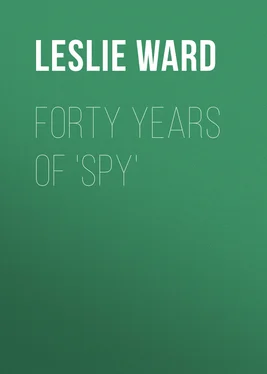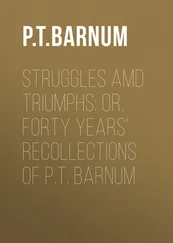Leslie Ward - Forty Years of 'Spy'
Здесь есть возможность читать онлайн «Leslie Ward - Forty Years of 'Spy'» — ознакомительный отрывок электронной книги совершенно бесплатно, а после прочтения отрывка купить полную версию. В некоторых случаях можно слушать аудио, скачать через торрент в формате fb2 и присутствует краткое содержание. Издательство: Иностранный паблик, Жанр: foreign_prose, foreign_home, visual_arts, на английском языке. Описание произведения, (предисловие) а так же отзывы посетителей доступны на портале библиотеки ЛибКат.
- Название:Forty Years of 'Spy'
- Автор:
- Издательство:Иностранный паблик
- Жанр:
- Год:неизвестен
- ISBN:нет данных
- Рейтинг книги:4 / 5. Голосов: 1
-
Избранное:Добавить в избранное
- Отзывы:
-
Ваша оценка:
- 80
- 1
- 2
- 3
- 4
- 5
Forty Years of 'Spy': краткое содержание, описание и аннотация
Предлагаем к чтению аннотацию, описание, краткое содержание или предисловие (зависит от того, что написал сам автор книги «Forty Years of 'Spy'»). Если вы не нашли необходимую информацию о книге — напишите в комментариях, мы постараемся отыскать её.
Forty Years of 'Spy' — читать онлайн ознакомительный отрывок
Ниже представлен текст книги, разбитый по страницам. Система сохранения места последней прочитанной страницы, позволяет с удобством читать онлайн бесплатно книгу «Forty Years of 'Spy'», без необходимости каждый раз заново искать на чём Вы остановились. Поставьте закладку, и сможете в любой момент перейти на страницу, на которой закончили чтение.
Интервал:
Закладка:
In after years my father told me with some amusement, how the Prince Consort (who was growing stouter) reduced the size of the painted figure of himself in my father's picture by drawing a chalk line, and remarking, "That's where my waist should be!"
I sat to my parents very often, and my father occasionally gave me sixpence as a reward for the agonies I considered I endured, standing in awkward attitudes, impatiently awaiting my freedom. In my mother's charming picture called "God save the Queen," which represents her sitting at the piano, her fingers on the keys, her face framed by soft curls is turned to a small group representing her children who are singing the National Anthem. Here I figure with sword, trumpet, and helmet, looking as if I would die for my Queen and my country, while my sisters watch with wide interested eyes.
My sisters and I often played about my mother's studio while she painted. She never seemed to find our presence troublesome, although I believe we were sometimes a nuisance, whereas my father was obliged to limit his attentions to us when work was finished for the day.
I loved to draw, and on Sundays the subject had to be Biblical, as to draw anything of an everyday nature on the Sabbath was in those days considered, even for a child, highly reprehensible (at all events, by my parents).
Even then I was determined to be an artist. I remember that one day my oldest friend, Edward Nash (whose parents were neighbours of ours) and I were watching the Seaforth Highlanders go by, and, roused perhaps by this inspiring sight, we fell to discussing our futures.
"I'm going to be an artist," I announced. "What are you?"
"I'm going to be a Scotchman," he replied gravely. In after life he distinguished himself as a great athlete, played football for Rugby in the school "twenty," and was one of the founders of the Hockey Club. He is now a successful solicitor and the father of athletic sons.
A very interesting personality crossed my path at this period in the shape of Sir William Ross, R.A., the last really great miniature painter of his time. He was a most courteous old gentleman, and there was nothing of the artist in his appearance—at least according to the accepted view of the appearance of an artist. In fact, he was more like a benevolent old doctor than anything else. When my sister Alice and I knew that we were to sit to him for our portraits, we rather liked, instead of resenting, the idea (as perhaps would have been natural), for he looked so kind. After our first sitting he told me to eat the strawberry I had held so patiently. I obediently did as he suggested, and after each sitting I was rewarded in this way. The miniature turned out to be a chef d'œuvre . It is so beautiful in its extreme delicacy and manipulation that it delights me always. My mother values it so much that in order to retain its freshness she keeps it locked up and shows it only to those who she knows will appreciate its exquisite qualities. Queen Victoria said when it was shown to her, "I have many fine miniatures by Ross, but none to equal that one."
We visited many artists' studios with our parents. I am told I was an observant child and consequently had to be warned against making too outspoken criticisms on the pictures and their painters. On one occasion a Mr. Bell was coming to dine; we were allowed in the drawing-room after dinner, and as his appearance was likely to excite our interest, we were warned by our governess against remarking on Mr. Bell's nose. This warning resulted in our anticipation rising to something like excitement, and the moment I entered the room, my gaze went straight to his nose and stayed there. I recollect searching my brain for a comparison, and coming to the conclusion that it resembled a bunch of grapes.
My father was a very keen student of archæology; and I think he must have known the history of every building in London inside and out! I remember that once he took us to Westminster Abbey, there, as usual, to make known to us, I have no doubt, many interesting facts. Afterwards we went to St. James' Park, where my father pointed out the ornamental lake where King Charles the Second fed his ducks, and told our governess that he thought it would be an excellent idea if when we returned we were to write a description of our adventures. The next day, accordingly, we sat down to write our compositions; and although my sister's proves to have been not so bad, mine, as will be seen, was shocking. The reader will observe that in speaking of St. James' Park, I have gone so far as to say "King Charles fed his duchess by the lake," which seems to imply a knowledge of that gay monarch beyond my years.
"Thhe other day you were so kinnd as to take us to Westminster Abbey we went in a cab and we got out of the cab at poets corner and then went in Westminster Abbey and we saw the tombe of queen Eleanor and then we saw the tomb of queen Elizabeth and Mary and the tomb of Henry VII and his wife lying by him and the tomb of Henry's mother, then we came to the tow little children of James II and in the middle the two little Princes that were smothered in the tower and there bones were found there and and bort to Westminster Abbey and berryd there. We saw the sword which was corrade in the procession after the battle of Cressy and we then saw the two coronation Chairs were the kings and queens were crowned and onder one of the Chairs a large stone under it that Edward brought with hin And we saw the tomb of Gorge II who was the last man who was berried there. Then we went to a bakers shop and we had some buns and wen we had done papa said to the woman three buns one barth bun and ane biscuit and papa forgot his gluves and i said they were in the shop and papa said silly boy why did you not tell me and then to the cloysters were three monks were berried then the senkuary were the duke of York was taken and then the jeruclam chamber and then to Marlborough house were Marlborough lived and then Westminster hall and then judge Gerfys house and the inclosid at S' james park were Charles II fed his duchess and then we came home and had our tee and then went to bed."
A visit to London, which made a far greater impression on me, was made later, when I went to Astley's Theatre. Originally a circus in the Westminster Bridge Road, started by Philip Astley, who had been a light horseman in the army, the theatre was celebrated for equestrian performances. "Astley's," as it was called, formed the subject of one of the "Sketches by Boz." "It was not a Royal Amphitheatre," wrote Dickens, "in those days, nor had Duncan arisen to shed the light of classic taste and portable gas over the sawdust of the circus; but the whole character of the place was the same, the clown's jokes were the same, the riding masters were equally grand … the tragedians equally hoarse.... Astley's has changed for the better … we have changed for the worse."
Thackeray mentions the theatre in "The Newcomes." "Who was it," he writes, "that took the children to Astley's but Uncle Newcome?"
Mr. Wilkie Collins and Mr. Pigott (afterwards Examiner of Plays) took us ; we had a large box, and the play— Garibaldi —was most enthralling. I was overwhelmed with grief at Signora Garibaldi's death scene. There were horses, of course, in the great battle, and one of these was especially intelligent; limping from an imaginary wound, he took between his teeth from his helpless rider a handkerchief, dipped it in a pool of water, and returned—still limping—to lay the cool linen upon the heated brow of his dying master.
Thrilling with excitement and fear, it never occurred to me that the battle, the wounds, and the deaths following were anything but real; but all my grief did not prevent me from enjoying between the acts my never-to-be-forgotten first strawberry ice.
Читать дальшеИнтервал:
Закладка:
Похожие книги на «Forty Years of 'Spy'»
Представляем Вашему вниманию похожие книги на «Forty Years of 'Spy'» списком для выбора. Мы отобрали схожую по названию и смыслу литературу в надежде предоставить читателям больше вариантов отыскать новые, интересные, ещё непрочитанные произведения.
Обсуждение, отзывы о книге «Forty Years of 'Spy'» и просто собственные мнения читателей. Оставьте ваши комментарии, напишите, что Вы думаете о произведении, его смысле или главных героях. Укажите что конкретно понравилось, а что нет, и почему Вы так считаете.












